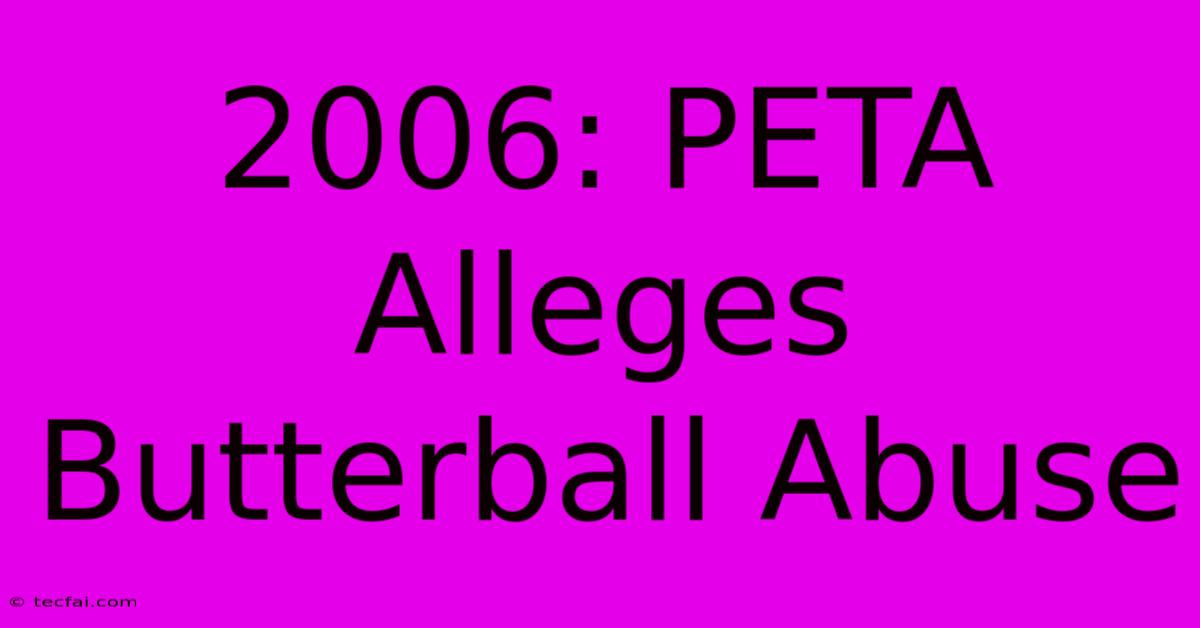2006: PETA Alleges Butterball Abuse

Discover more detailed and exciting information on our website. Click the link below to start your adventure: Visit Best Website tecfai.com. Don't miss out!
Table of Contents
2006: PETA Alleges Butterball Abuse – A Look Back at a Pivotal Moment in Animal Welfare
The year is 2006. Concerns about animal welfare were growing, and one company found itself squarely in the spotlight: Butterball, a prominent name in the turkey industry. This year witnessed a significant clash between the company and People for the Ethical Treatment of Animals (PETA), marking a pivotal moment in the ongoing conversation about ethical treatment within the food industry. This article delves into the allegations made by PETA, Butterball's response, and the lasting impact of this controversy.
PETA's Allegations: Graphic Footage and Public Outcry
PETA's 2006 campaign against Butterball involved the release of undercover footage allegedly depicting cruelty and abuse at Butterball turkey farms. The videos, which quickly gained traction in the media and online, purportedly showed birds suffering from severe overcrowding, debilitating injuries, and unsanitary conditions. The images were graphic, prompting immediate outrage from animal rights activists and the public alike. Specific allegations included claims of workers rough handling turkeys, leading to injuries, and a general lack of concern for the birds' welfare. This graphic depiction directly challenged the public perception of Butterball and the industry as a whole.
The impact of these allegations was significant. PETA's campaign leveraged the power of emotional imagery and public outrage, effectively pushing the conversation about animal welfare into the mainstream. The organization successfully framed Butterball not just as a producer of turkeys, but as a symbol of potentially widespread cruelty within factory farming practices. This was a strategic move, amplifying the impact far beyond a single company.
Butterball's Response: Damage Control and Industry Scrutiny
Faced with a major public relations crisis, Butterball responded with a mixture of damage control and reassurances. The company initially disputed some of PETA's claims, asserting that their farms adhered to industry standards and emphasized their commitment to animal welfare. They countered PETA's claims with statements highlighting their efforts to improve animal handling and husbandry practices. However, the damage was done. The allegations, even if partially disputed, had cast a long shadow on the Butterball brand.
The incident forced Butterball and the entire turkey industry to confront growing public concern about animal welfare. The controversy raised questions about industry regulations, oversight, and the need for greater transparency in farming practices. It prompted calls for stricter regulations and independent audits of turkey farms to ensure humane treatment of animals. This pressure eventually led to increased scrutiny and some industry-wide changes, albeit gradual.
Lasting Impact: A Catalyst for Change?
The 2006 PETA campaign against Butterball served as a significant catalyst for change in the poultry industry, although the extent of that change is still debated today. While the immediate fallout was substantial for Butterball's public image, the longer-term impact involved a broader shift in public perception and expectations concerning animal welfare in food production. The incident highlighted the effectiveness of activist campaigns using undercover investigations and graphic imagery to generate public pressure and influence corporate behavior.
The controversy also intensified the debate about the ethics of factory farming, leading to increased consumer awareness and demand for more humane and sustainable food production practices. This enduring legacy underscores the importance of responsible corporate practices and the powerful role of animal welfare advocacy groups in shaping industry standards and public opinion. The story serves as a reminder of the ongoing conversation surrounding the ethical considerations within our food system. This event, therefore, remains a significant case study in corporate responsibility and the evolving landscape of animal welfare advocacy.

Thank you for visiting our website wich cover about 2006: PETA Alleges Butterball Abuse. We hope the information provided has been useful to you. Feel free to contact us if you have any questions or need further assistance. See you next time and dont miss to bookmark.
Featured Posts
-
Bonnie Blue Sparks This Morning Backlash
Nov 27, 2024
-
Feyenoord 3 3 Man City Comeback
Nov 27, 2024
-
Iafallo Hellebuyck Lead Jets Past Wild 4 1
Nov 27, 2024
-
Celebritys Coles Reflects On Loss
Nov 27, 2024
-
Barca Academy Pro Ny Financial Policies
Nov 27, 2024
